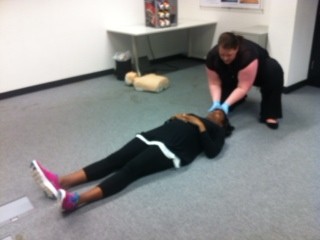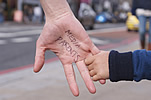5 Minutes with… Radica Anikpe on a National Film and Television First Aid course
August 27, 2013 @ 10:35 pm Posted in News CommentsRadica Anikpe writes about the National Film & TV Short Course in First Aid.
I spent a Friday in Beaconsfield, Buckinghamshire. What I was I doing in the Home Counties? The eagle-eyed among you will have already made the connection between Beaconsfield and the National Film and Television School. I won a Media Parents sponsored place on the First Aid for Film and Television.
Call me peculiar, but I’ve long had a yen to do a first aid course, so winning the place made this job-seeker super happy. Essentially, myself and five other meeja lovelies, as well as our cool-as-expletive-deleted trainer, Vicki Clare, spent the day discussing the various ways that people on film and television sets get themselves into bother, and what the appropriate first aid response is. It would not be unwise to suppose that fear of the budget can be the reason accidents happen. And we have all, I think, had that fear, especially in this 21st century era of the disappearing budget line(s).
So. Just in case you miss it, the moral of this part of the story is: if you are doing something, and you think, “Ooh, I’ll just”. Just don’t. “I’ll just pick up this load of wire cable without any safety gloves”. Result? Sliced fingers. Two re-attached, one didn’t. “I’ll just quickly dig this trench in my flip-flops”. Result? Two prongs of a gardening fork embedded in a foot. “I’ll just cut through this live cable in my non- rubber soled trainers, with only my mate and a wooden broom for company”. Result? A below-the-knee amputation and lives forever changed.

Radica assuming the recovery position at the NTSC First Aid Course. http://www.mediaparents.co.uk/freelancers/4077/radica-anikpe
We also talked about the particular horror of watching an accident or incident unfold. Stick your hand up if you were watching the football when Fabrice Muamba hit the deck? Thousands of people willing, wishing and hoping that whatever it was that felled the fit, young footballer, could be quickly cured. I remember watching an interview with cardiologist, Andrew Deaner, who sprinted on to the pitch to assist, after watching CPR being given and discussing with his brother. If an actual, eminent doctor needs permission, it is hardly surprising that it feels like an impossible task for most of the rest of us.
It’s interesting, isn’t it, the psychology of crowds? Haven’t we all watched at the scene of an accident, open-mouthed with horror, willing someone competent along? “Well”, says Vicki – with an illusion-shattering smile on her face – “Something is better than nothing. Imagine if your actions enabled someone’s loved ones the opportunity of getting to hospital, in order to say goodbye. That has to be worth whatever personal price paid, hasn’t it?”
The upshot of my day in the shires is this. If you were to have a stroke, or if you were to choke in front of me (and you gave me permission – I am serious. If you ask a choking victim if you can help them, and they say no, you can’t touch them because you are actually asking for permission to assault them. Happily, once they are unconscious, implied consent kicks in and you may save their life.) I would have an idea of what to do. That’s better than calling for an ambulance with fingers crossed.
 And in the unhappy event of you having a heart attack in front of me, I can now use a defibrillator. I am indecently excited about this fact, but I am a swot by nature, the accumulation of information is the reason that I get outta bed of a morning. Obviously, we’d both rather that didn’t happen. But if it does, I got your back. And if you find yourself on a shoot, beyond tired and inching toward the finish line and think, “Oh, I’ll just”. Just don’t. Take a deep breath and ask yourself, “What is my life worth? Is it worth the risk?” Is it?
And in the unhappy event of you having a heart attack in front of me, I can now use a defibrillator. I am indecently excited about this fact, but I am a swot by nature, the accumulation of information is the reason that I get outta bed of a morning. Obviously, we’d both rather that didn’t happen. But if it does, I got your back. And if you find yourself on a shoot, beyond tired and inching toward the finish line and think, “Oh, I’ll just”. Just don’t. Take a deep breath and ask yourself, “What is my life worth? Is it worth the risk?” Is it?
Radica Anikpe is currently looking for research or writing work as she is returning to TV after caring leave. She is also looking for sponsorship for a course so please make contact with her here : http://www.mediaparents.co.uk/freelancers/4077/radica-anikpe
TOP HEALTH & SAFETY TIP: Whether or not you are first aid trained, if you need to help someone with a defibrillator, there will always be a defibrillator and trained first aider in your nearest tube station.
For more information on Short Courses at NFTS :
http://nfts.co.uk/our-courses/short-courses



